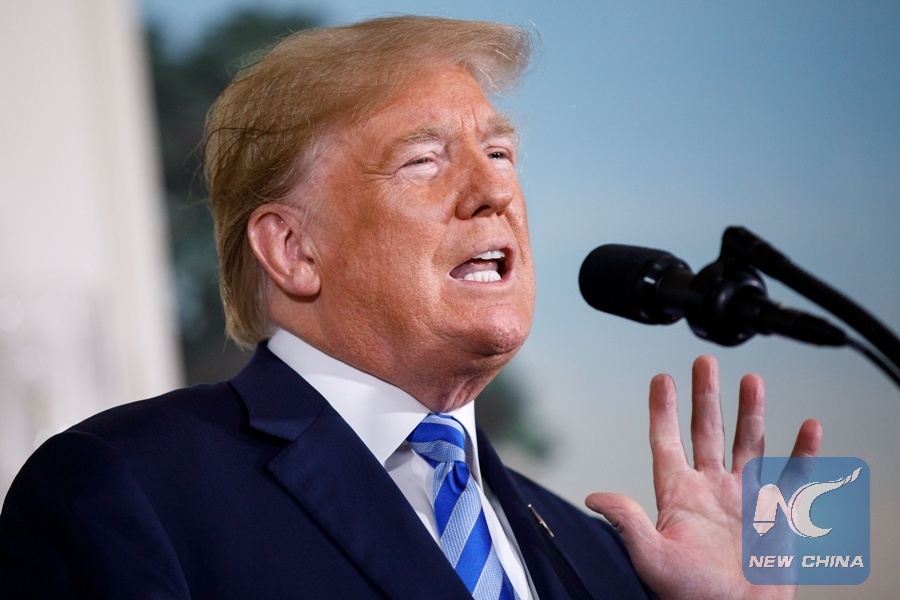
U.S. President Donald Trump delivers a speech at the White House in Washington D.C., the United States, on May 8, 2018. U.S. President Donald Trump said that the United States will withdraw from the Iran nuclear deal, a landmark agreement signed in 2015. (Xinhua/Ting Shen)
by Matthew Rusling
WASHINGTON, May 21 (Xinhua) -- Monday saw U.S. Secretary of State Mike Pompeo threaten to slap the biggest sanctions in history on Iran, if Tehran fails to comply with U.S. demands. U.S. experts said their country is making a full-on effort to force Iran's hand.
"This administration is moving ahead at full speed," Dan Mahaffee, senior vice president and director of policy at the Center for the Study of Congress and the Presidency, told Xinhua.
In a speech on Monday from Washington, Pompeo listed several demands that would be included in an updated nuclear treaty with Tehran. Those included that the Islamic Republic pull its forces out of embattled Syria.
Pompeo threatened what he called the "strongest sanctions in history" if the Iranian government fails to comply, adding that Washington "will apply unprecedented financial pressure on the Iranian regime."
The U.S. secretary of state unveiled a list of a dozen basic requirements for a new treaty, which included that the regime halt enrichment of uranium, and demanded that Iran allow access to all nuclear sites nationwide.
Pompeo said Tehran would be required to halt what the U.S. government said is intervention in conflicts in the Middle East, such as those in Lebanon and Yemen, adding that the United States will "track down Iranian operatives and their Hezbollah proxies operating around the world and crush them."
The comments came not long after U.S. President Donald Trump's decision to pull out of the Iran nuclear deal, and only two months after Pompeo replaced former Secretary of State Rex Tillerson.
Experts said the move was intended to remove voices of dissent from the administration, and to essentially allow Trump to be himself. Critics said this is likely to lead to a more hard-line administration.
Brookings Institution Senior Fellow Darrell West told Xinhua that the most important element of Pompeo's speech was the threat to impose the strongest sanctions on Iran in that country's history.
"If that is the case, it would complicate the efforts of European companies to extend trade relations with Iran. Their governments could continue their agreement with Iran, but risk running afoul of U.S. sanctions. They might have to choose between doing business with Iran or the United States," West said.
"Most European nations are likely to continue their support of the Iran deal because they opposed Trump's ending of that agreement. They want to continue having trade relations with Iran even if the U.S. goes the other direction," West said.
Mahaffee said that Pompeo laid out a comprehensive plan to push back against Iranian power in the Middle East and did so with a willingness to confront European allies' interests in improved economic ties with Iran.
"While the international coalition may be unlikely to come from the way that the Trump administration has approached this new course, there will still be efforts to coordinate with Europe and prevent unilateral sanctioning by the United States," Mahaffee said.

